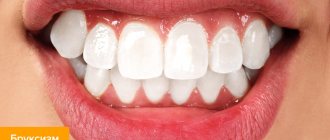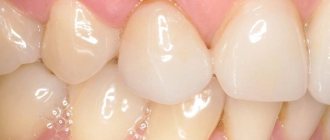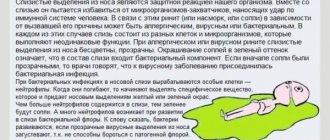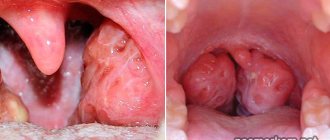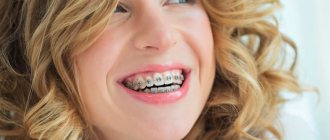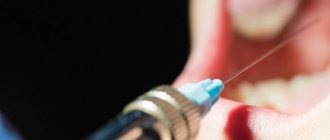Author of the article:
Soldatova Lyudmila Nikolaevna
Candidate of Medical Sciences, Professor of the Department of Clinical Dentistry of the St. Petersburg Medical and Social Institute, Chief Physician of the Alfa-Dent Dental Clinic, St. Petersburg
The grinding of teeth at night brings horror to a person's family and friends. Agree, you can hear a creaking sound in a dark room. Neurologists call unconscious short-term teeth grinding bruxism, and dentists advise not to delay the treatment of this problem. Let's look at the causes of nighttime grinding and determine ways to eliminate it.
Bruxism - what is it
Uncontrolled grinding of teeth, resulting from spasms of the masticatory muscles. If you come across texts about the Carolini phenomenon, odonterism, “teeth grinding disease” - they are all about bruxism, and the names listed are synonyms of bruxism. Translated from ancient Greek, bruxism means grinding.
Dentists distinguish two types of this disease.
- Directly grinding, that is, the friction of the teeth against each other.
- Clanching is a static clenching of teeth that occurs without friction.
Bruxism is often chronic, causing discomfort to a person for many years. If left untreated, it results in complications: problems with the temporomandibular joint, chronic stress, and abrasion of tooth enamel.
It is necessary to distinguish between childhood and adult bruxism - they have many significant differences. Here we will look in detail at the course of this disease in adults. There is a separate article on childhood “teeth grinding disease”.
Night grinding of teeth.
A person does not realize that he grinds his teeth when he sleeps. Doesn't wake up from gritting her teeth and may not be aware of the problem at all. Only his relatives can talk about it.
Daytime teeth grinding.
This type of bruxism is already recognized by a person. But clenching of teeth occurs involuntarily and cannot be controlled. During daytime bruxism, a person feels discomfort, which causes periodic strong tension in the facial muscles.
Diagnostic methods
Diagnosis of bruxism involves studying the patient’s complaints, as well as assessing indirect signs based on the results of a routine visual examination. The leading method of objective diagnosis is the use of Brux Checkers - special mouthguards that are made on the basis of a plaster cast of the patient’s jaw. These aligners allow the detection of occlusal obstructions. The doctor issues brux checkers to wear overnight, after which the patient submits them to the clinic for analysis. Using diagnostic aligners, a specialist determines which teeth bear the greatest load.
Electromyography and polysomnography methods make it possible to register the pathological activity of the masticatory muscles and confirm the diagnosis of bruxism.
But, as a rule, it is possible to understand the reasons only with the help of comprehensive diagnostics. So, in the case of bruxism in adults, psychosomatics may occur, so consultation with a psychologist or psychotherapist will be required.
The most common consequences of teeth grinding in adults
- Increased tooth wear. Constant friction causes teeth to lose their natural height. In general, this is a natural process: with age, all people's teeth become a little shorter. But with bruxism this happens much faster. Plus, constant grinding of teeth results in frequent loss of fillings, the appearance of chips and roughness.
- Pain in the mouth. It appears due to the fact that during bruxism a person often “bites” his cheeks. Wounds and abrasions appear that do not have time to heal.
- Headache, nagging pain in the neck, ringing in the ears, dizziness. If the cause of these neurological symptoms cannot be substantiated by other diseases, then there is a high probability that these are the consequences of constant teeth grinding.
- Drowsiness, irritability, general “weakness,” fatigue. All this can appear if a person suffering from bruxism has trouble sleeping at night due to constant clenching of teeth during sleep.
A person himself can rarely understand that the cause of his health problems is bruxism. The diagnosis can be made only with the help of a special study - electromyography.
Psychological help
The psyche of children and teenagers is unstable. Therefore, psychological factors, including anxiety, often lead to the development of bruxism.
In an anxious state, other symptoms may be observed: the habit of pulling and twisting hair, biting nails, etc.
The trigger for bruxism can be changes in a child’s life: moving, changing schools, parents’ divorce, various conflicts, etc. In such cases, a psychologist will help.
Why do adults clench their teeth?
There is no clear answer. However, research and observations have allowed doctors to identify several hypotheses for the occurrence of bruxism.
- Bad habits
Sometimes, in order to concentrate, some people chew on a pen or toothpick. Over time, this action can become a conditioned reflex. And when a person needs to concentrate, he involuntarily clenches an imaginary toothpick between his teeth. This may explain the occurrence of teeth grinding during sleep. - Nervous stress
Often adults clench their teeth when they want to hold back in a stressful situation. If this happens for a long time, the body may develop an uncontrollable habit: the slightest overexertion - we clench our teeth tightly. This is another version of the appearance of bruxism at night in adults. - Neurological diseases
Also, people suffering from a number of neurological diseases often grind their teeth at night: epilepsy, tremor, enuresis, Huntington's disease, Parkinson's disease - all of them are characterized by such a symptom as bruxism. - Insomnia
If a person does not sleep normally for a long time, often wakes up at night, is more often in a state of shallow rather than deep sleep, he clenches his jaw uncontrollably because he begins to get nervous because he cannot get a good night's sleep. - Pathologies of the dental system
Bruxism can be caused by a pathological bite: it causes an uneven distribution of the load on the teeth. For treatment in this case, read the article “Bite correction in adults.” Also, the cause of clenching teeth at night may be their overcrowding. With this disorder, the teeth do not close completely. In addition, dentists studying the phenomenon of bruxism note that its cause may be the desire of people to “shorten” fillings or dentures that were installed incorrectly: a person tries to “erase” them and often begins to close their jaws tightly and move them relative to each other . Over time, this can become an unconscious habit.
For quite a long time, bruxism was considered a symptom of helminthic infestation. Scientific research has not confirmed this theory.
Conditions for treating alcoholism in the clinic
Comprehensive treatment and constant medical supervision are the main things that clinical conditions can provide to a person who has become dependent. Factors for successful treatment in a drug treatment hospital are:
- selection of an individual course taking into account concomitant diseases;
- attention to each patient, round-the-clock monitoring for violent behavior;
- anonymous stay in the center;
- recovery from psychosis followed by recovery from addiction.
Alcohol psychoses show that it is almost impossible to free yourself from addiction on your own in the later stages of alcoholism. Relatives and friends should be careful in their demands on a drinking relative. Abrupt abstinence from alcohol can cause enormous harm to his psyche. In this situation, you need qualified medical help and comprehensive treatment.
Psychosomatic explanation of bruxism
Now one of the most common versions of teeth grinding is psychosomatic. That is, bruxism is the result of hidden experiences, long-suppressed emotions, complexes, and fears. All this can cause spasm of the chewing muscles. There is also an assumption that bruxism accompanies a number of mental disorders. Thus, scientists from Germany studying “adult” bruxism conducted a study, the results of which indicate that teeth clenching is directly related to chronic depression.
ATTENTION!
Confusion of the soul is the main cause of teeth grinding. This was the opinion of Hippocrates. And he was probably not far from the truth.
Treatment
The diagnosis is made based on interviews with relatives and the patient himself. The main points are:
- experience of regular alcohol consumption;
- time of the last binge and the onset of hangover;
- what alcohol-containing substances were used.
New psychoses can be successfully treated. Intensive therapy includes cleansing the blood of toxic substances and influencing the brain with drugs from the group of antipsychotics. Clarification of consciousness during the fight against psychosis motivates the patient to undergo treatment for alcohol addiction. No one has the right to place him in a clinic without the patient’s consent. But he must clearly understand one thing: a repeated attack is a direct path to dementia.
What procedures can a dentist not perform for bruxism?
Chronic teeth grinding often makes it impossible to carry out dental treatment: for some types it is an absolute contraindication, for others it is a relative one. It all depends on the severity of bruxism.
Treatment with braces.
For bruxism, dentists prefer to replace it with mouth guards. They are softer than braces and do not injure the mucous membranes, gums and tongue, which often happens if a person regularly clenches his jaw tightly. In addition, braces often break due to bruxism.
Installation of ceramic crowns
undesirable for “teeth grinding disease.” Despite the fact that modern dental ceramics are quite durable, they still cannot withstand the increased pressure that occurs during bruxism, and the ceramic crown is destroyed.
For implantation
Bruxism is considered an absolute contraindication, since the risk is too high that due to constant clenching of the teeth, the implant will become loose and fall out.
Restoration with lumineers, veneers, composites
It is ineffective for bruxism. It can be done, but it will not be possible to avoid mechanical damage to mini-prostheses. This has been recorded over many years of observations.
Prognosis and prevention
The prognosis for bruxism is favorable. Treatment is long-term and can take several months. In childhood, these symptoms require constant monitoring and often go away on their own. As a preventative measure, it is recommended to follow a few simple rules:
- avoid stress and nervous tension;
- normalize sleep and wakefulness;
- do not eat immediately before bed, avoid active physical activity in the afternoon;
- undergo regular preventive examinations at the dentist.
Bruxism is a common pathology. It manifests itself in no less than 40-50% of preschool children and 7-10% of adults. The main difficulty is to detect its symptoms, since they appear at night. Specialists from the Clinical Brain Institute will conduct a full diagnosis, taking into account the patient’s age and physiological condition, and select the most effective treatment regimen.
Should adults treat bruxism?
Teeth grinding is an unpleasant disease, but its severity for the patient, of course, cannot be compared with, say, a complete absence of teeth and caries. However, the long-term consequences of bruxism are still unpleasant. It may interfere with prosthetics, implantation, and orthodontic treatment with braces, if necessary. In most cases, you will simply need to get rid of uncontrollable teeth clenching, but this will require additional time and money. But, in general, we are lucky that we do not live in the Middle Ages - then the Inquisition interpreted gnashing of teeth as a symbol of connection with the devil and executed people. Today we have all the means to get rid of this disease. The main thing is not to delay your visit to the dentist and start treatment on time.
Dangerous symptoms: when should you see a doctor?
The question of when to start treatment for bruxism in children worries many parents.
As a rule, the disease goes away on its own, without any consequences, by the age of 12–13 years. This is due to the fact that by this period the formation of molars is completed. No treatment is required for this form of bruxism. However, there are times when the picture is not so rosy. You should contact your doctor immediately if your child exhibits the following symptoms:
- headache and/or toothache in the morning;
- rapid wear of teeth;
- long and intense attacks at night (more than 10 seconds).
Complicated bruxism in children leads to quite unpleasant consequences, including gum disease and significant tooth wear.
There is a solution for each case!
1 procedure
1 Botulax procedure Gentle and safe effect For mild cases of hypertonicity of the masticatory muscles RUB 15,000. 15,000 rub.
3 procedures
A course of 3 Botulax procedures Gentle and safe effects For moderate and severe stages of hypertonicity RUB 35,000. 35,000 rub.
Botulinum therapy can help if you have a habit of clenching your jaw tightly and grinding your teeth, you suffer from increased abrasion of enamel and destruction of crowns.

